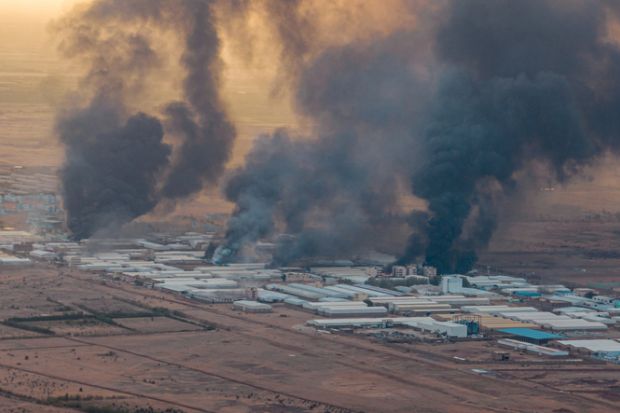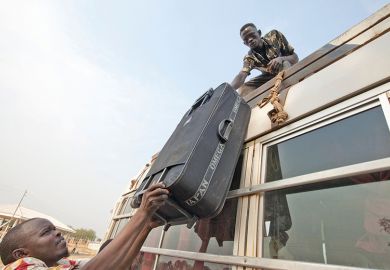The conflict in Sudan between the Sudanese Armed Forces and the Rapid Support Forces, a paramilitary militia, has plummeted the country into a humanitarian crisis. In just a few short weeks, the fighting has already claimed 1,000 lives, many of them civilians. It has also forced a million people to flee their homes, becoming internally displaced or asylum seekers in foreign lands.
Sudan’s higher education institutions have not escaped the destruction. Indeed, Khartoum, the epicentre of the conflict, is a university metropolis. The largest and most prestigious institutions from among the country’s 48 universities and university colleges are located in the Khartoum conurbation. This explains why students and young people form a significant proportion of the war casualties. In the initial days of the conflict, students, in the midst of exam season, were caught on their campuses. Others were killed in their own neighbourhoods.
As the conflict continues unabated, there is growing concern about its long-term impact on Sudanese society in general and its tertiary sector in particular.
The first concern regards Sudan’s status as a hub for international students. Before the conflict erupted, the country was hosting 24,000 foreign students from 91 nations, predominantly in Africa and the Middle East. Most of the African students in Sudan – from countries such as Egypt, Nigeria, Chad, South Sudan, Kenya and Somalia – study at Khartoum’s International University of Africa.
The unaffordability of university education in Western countries, such as the US, the UK and France, is driving many African countries to look closer to home to meet their tertiary educational needs. Sudan’s relatively large higher education system attracted many of them, particularly given its strength in multiple disciplines, such as Arabic language, humanities, Islamic studies, medicine, agriculture and, ironically, conflict and peace studies. The University of Khartoum, which began as an outpost of the University of London more than a century ago, is particularly strong in several of these disciplines and is a major draw for graduate students.
Those foreign students are very welcome because they are a source of substantial income for the universities, paying their fees in much-desired hard currencies. But the conflict has compelled them to go home – and, given their terrible ordeals, it is highly unlikely that they will all return. Sudan will also struggle to recruit new students after the destruction of its reputation among African governments and parents for being a relatively safe destination. The effect on Sudan’s universities will be incalculable and will be felt for many years to come.
As the war endures, it is also destroying property, including university campuses. The scale of the infrastructural devastation, particularly in the Khartoum region, is grave. Homes and business have been ransacked and looted, and universities have been attacked by the warring armies.
For instance, the Mohammed Omar Bashir Centre for Sudanese Studies at Omdurman Ahlia University was burned and looted. The university was founded in the 1970s as an intellectual space for Sudanese liberalism by Mohammed Omar Bashir – or MOB, as he was widely known – a renowned Sudanese scholar of humanities at the University of Khartoum. In recognition of his outstanding work, the university founded a centre in his name to promote its ideals, and his reputation drew donations for its library from across the intelligentsia of the country. Some of the collections constituted scarce and out-of-print books, theses and manuscripts. All are now reportedly destroyed.
It has also been reported that the military rivals destroyed Sudan’s Natural History Museum and that its National Museum, which possesses more than 100,000 items dating as far back as 2,500BC, has been breached by the RSF. Artefacts have apparently been looted.
While damaged university infrastructure may be rebuilt, lost manuscripts, historical documents and objects are absolutely irreplaceable. This will have negative implications for Sudan’s reputation and capacity as a research power within Africa.
Nor is the destruction likely to have ended. As the conflict rages on, there will be no respite to the inhabitants of Sudan’s national capital, including its scholars and students. And the impact of this conflict will have irreversible consequences for higher education, not only in Sudan but far beyond.
Kuyok Abol Kuyok is an adjunct associate professor, University of Juba, South Sudan.
Register to continue
Why register?
- Registration is free and only takes a moment
- Once registered, you can read 3 articles a month
- Sign up for our newsletter
Subscribe
Or subscribe for unlimited access to:
- Unlimited access to news, views, insights & reviews
- Digital editions
- Digital access to THE’s university and college rankings analysis
Already registered or a current subscriber?




